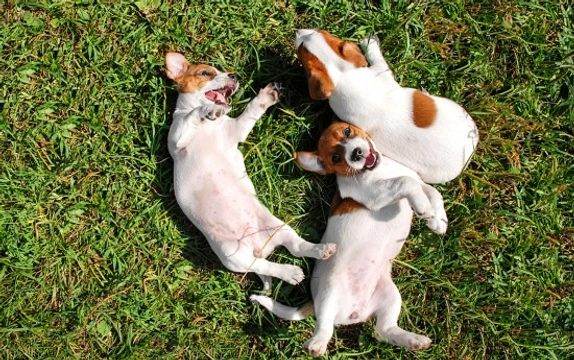
Identifying the elements that contribute to a puppy growing up to be aggressive
There is a great deal of debate, usually referred to as “nature vs. nurture” as to whether genetically inherited traits or treatment and living environment ultimately affect the personality of a dog, and cause them to display certain behaviours. In reality, the ultimate behaviour or temperament of any dog will usually come down to a combination of inherited traits and life experiences. Any dog with good natured parents might turn into an aggressive dog if incorrectly taught and handled, and dogs of so-called vicious or dangerous breeds can make good family pets with the right training and handling.
While it is not always possible to predict the adult temperament of a puppy and how likely they are to show aggression and a tendency to bite, a range of factors that happen (or don’t happen) when the puppy is young can certainly mean that the puppy starts life at a disadvantage. This can mean that the puppy is exponentially more likely to be quick to bite as an adult.
Read on to learn more about the combination of elements that can lead to a puppy growing up to be aggressive or quick to bite as an adult.
Irresponsible breeding
Breeding should be undertaken with a great deal of thought and planning, which also includes carefully considering the temperament of both parent dogs. However, puppy farms and irresponsible breeders are unlikely to do this, and potentially, poorly socialised or aggressive dogs may be bred regardless, meaning that their puppies can both inherit a predisposition to aggression, and learn from observation of their dam.
Failing to learn from littermates
Puppies learn an awful lot about bite inhibition and getting on with other dogs by the responses and socialisation that they get with their littermates, such as how to play appropriately, how to share, how to get on with others, and that biting is undesirable.
Lone puppies, orphaned puppies and hand-reared puppies will miss out on this stage of emotional development, which, in combination with other factors, can lead to them reaching adulthood without ever having learned about a large and important range of social skills.
Not enough contact with people
Puppies should be handled from a young age, and have plenty of contact with people. This teaches the puppies that humans are a part of their everyday life, the bringers of food, and the providers of care. Learning to associate people with all things positive, and learning how to behave around them and what is and is not ok is very important. Puppies that are not handled enough and don’t see enough of people when they are young will not gain the learned skill of understanding the positive role of people in their lives, and to welcome them and not fear them or misunderstand how to behave around them.
Negative experiences
A puppy that is taught to fear people from a young age will be at a real disadvantage as they get older, and any negative experiences involving people that a puppy goes through will have a significant effect on their adult development.
A puppy that is nervous around people or trained to be aggressive with strangers is exponentially more likely to grow up with aggressive traits, defensive aggression reactions or a tendency to bite than a puppy that is well raised and treated kindly by people.
Lack of direction
Puppies under six months of age are most receptive to learning new things and getting feedback on the world around them, which they will retain throughout their lives. After the puppy is weaned, it is vitally important that the people who are responsible for the puppy’s care continue to guide and interact with the puppy, giving them feedback on good and bad behaviour, continuing to teach them about bite inhibition, and ensuring that the puppy understands their role within the home.
A puppy that is coddled, fed whatever they want whenever they want and not given any boundaries will soon see themselves as the alpha in the relationship, and will begin to display typical alpha dog behaviours as a result of this. This can mean being snappy or aggressive when someone asks them to do something that they do not want to do, or denies them something that they want.
Poor training
Training is an ongoing process that should not stop when the puppy reaches a certain age! Teaching the pup to be obedient, responsive and good mannered is vitally important, as is correcting the dog if they growl, show signs of aggression, nip or bite, or try to take the alpha role.
Puppy handling and training should be clear, consistent and easy for the pup to understand, and is vitally important to ensure that the puppy grows up with good manners, good bite inhibition, and a good understanding of their role in life, and the role of the people around them.



